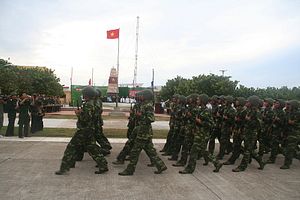Heading into the weekend, here’s some (mostly) defense linkage:
Earlier this week on Flashpoints, Carl Thayer outlined the strategic logic behind Vietnam’s counterinvention strategy towards China. Coincidentally, the same day that we published Thayer’s piece Real Clear Defense published a piece by Kyle Mizokami outlining the five weapon systems Vietnam will need to implement this strategy. They complement each other nicely.
Also at Real Clear Defense, Joseph A. Bosco argues that the problem for the U.S. in preventing China from militarily invading Taiwan is not “that China thinks it can defeat America in battle. It is that it believes it can defeat America without battle.”
A Council of Foreign Relations-sponsored Task Force, which was chaired by General David H. Petraeus and Robert B. Zoellick, released a new report this week arguing that the U.S. should pivot to, well… America. Specifically, the task force argues that U.S. policy should prioritize strengthening the integration of North America — that is, the United States, Canada and Mexico.
Over at the Center for a New American Security, Richard Fontaine has a great new report on “Reenergizing the Internet Freedom Agenda in a Post-Snowden Era.” For the record, Fontaine grasped the importance and challenges the U.S. would face in advancing internet freedom long before the Snowden era.
Also at CNAS, Dr. John Lee of the University of Sydney published a recent report on “Nonmilitary Approaches to Countering Chinese Coercion: A Code of Practice for the Asia-Pacific.”
And speaking of Sydney, Sydney Morning Herald columnist, Matt Wade, argues that Australia is currently too risk adverse to capitalize economically on the Asian Century.
Robert Kaplan explains why war has paradoxically been a good thing for mankind.
No topic has been analyzed more among American elites over the last 15 years than terrorism. It’s therefore somewhat surprising that (as far as I know) frequent War on the Rocks’ contributor and CNA analyst William Rosenau is one of the first people to comprehensively analyze America’s “first war of terrorism” to glean lessons that can be applied against its better known second war on terrorism. This seems like a particularly good idea now that lone wolf jihadists seem to be the biggest threat to the U.S. homeland.
Bonus: If you don’t feel like reading this weekend, check out this video of CIMSEC’s Matt Hipple explaining “how the military could, and should, use drones as decoys/countermeasures for ships and aircraft.” H/T to ASPI’s Natalie Sambhi and Penelope Czyzewska.
































